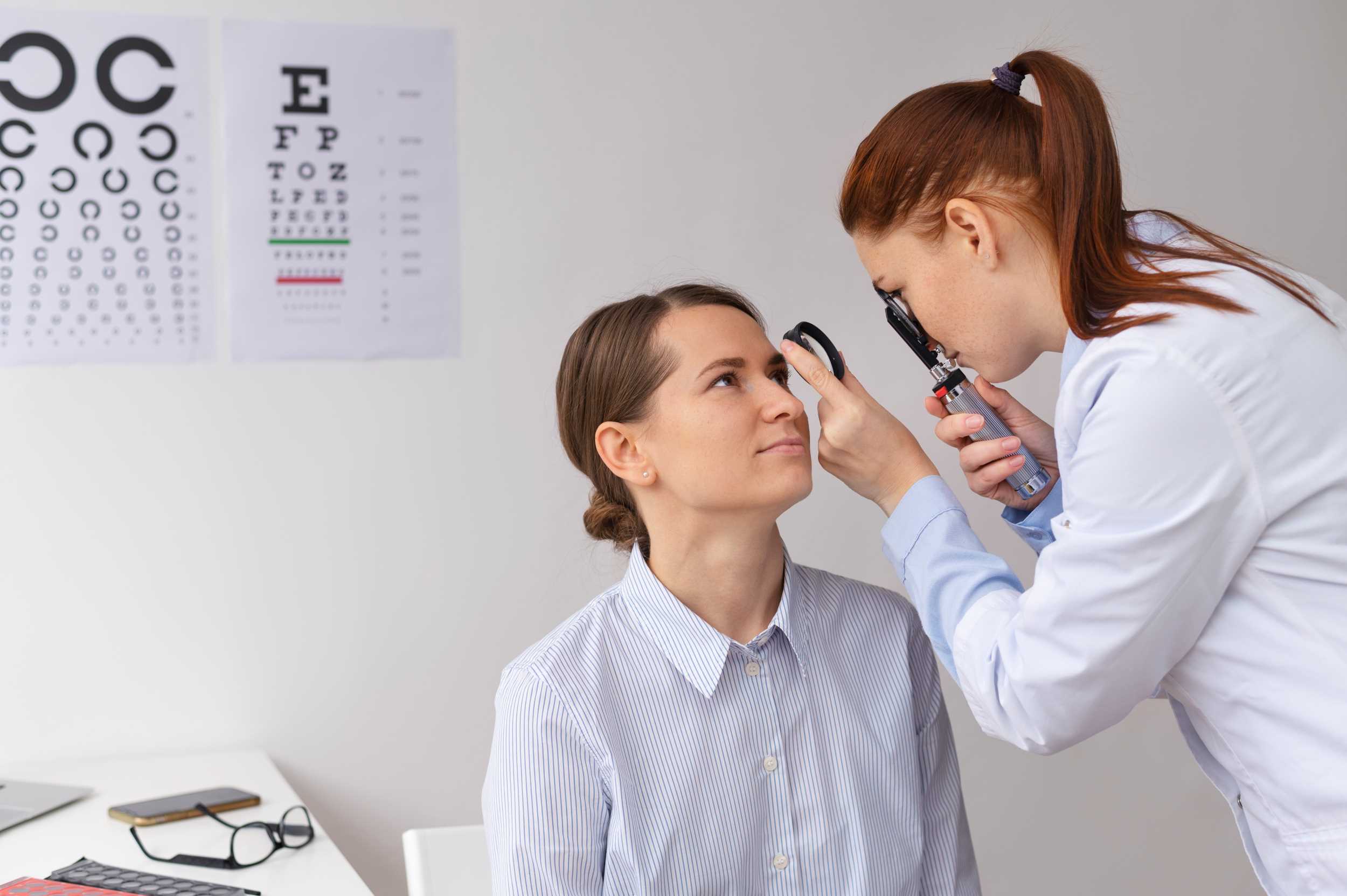
Image Source: Freepik.com
When taking care of your eyes, regular visits to your ophthalmologist go beyond achieving a perfect 20/20 vision. Your eyes are complex organs that require comprehensive care to maintain optimal eye health. This article explores the importance of visiting your ophthalmologist and delving deeper into eye health.
Importance Of Regular Eye Exams
Regular eye exams are crucial for maintaining good eye health. These exams allow your ophthalmologist to assess your vision and detect potential issues early on. While many people associate eye exams with getting their prescription for glasses or contact lenses, the scope of these exams goes far beyond that.
During your eye exam, your ophthalmologist will thoroughly examine the health of your eyes, looking for signs of common conditions such as glaucoma, cataracts, and macular degeneration. By identifying these conditions early, your ophthalmologist can provide early intervention to prevent future complications and preserve your vision.
In addition to detecting eye conditions, regular eye exams can reveal underlying health issues such as diabetes, high blood pressure, and even certain types of cancer. Your eyes are windows to your overall health, and a comprehensive eye exam can provide valuable insights into your well-being.
Common Eye Conditions And Their Symptoms
Understanding common eye conditions and their symptoms is essential for maintaining good eye health. While some eye conditions may be hereditary, others can develop due to various factors such as age, lifestyle, and environmental exposure. By recognizing the symptoms, you can seek timely medical intervention and prevent further damage to your eyesight.
One of the most common eye conditions is glaucoma, which occurs when there is increased pressure inside the eye, leading to optic nerve damage. Symptoms of glaucoma may include blurred vision, eye pain, and the appearance of halos around lights. Another prevalent condition is cataracts, which cause clouding of the eye’s natural lens. Symptoms of cataracts include blurry vision, sensitivity to light, and difficulty seeing at night.
Macular degeneration is another eye condition that affects the central part of the retina, leading to a loss of central vision. Symptoms of macular degeneration may include distorted vision, difficulty recognizing faces, and the appearance of dark spots in the central vision.
Understanding 20/20 Vision And Its Limitations
We often refer to having a 20/20 vision when we think of good vision. But what exactly does this mean? In simple terms, 20/20 vision refers to the ability to see at a distance of 20 feet, which is what a person with normal vision can see at the same distance. However, it’s important to note that 20/20 vision does not mean perfect vision.
Even individuals with 20/20 vision may have underlying eye conditions that can affect their visual health. Regular eye exams are crucial for detecting these conditions and providing appropriate treatment. Your ophthalmologist can assess your visual acuity beyond 20/20 to ensure your eyes function optimally.
Beyond 20/20: Exploring Different Measures Of Visual Acuity
While 20/20 vision is a commonly used measure of visual acuity, your ophthalmologist may use other measures to evaluate your eyesight. One such measure is visual acuity testing using a Snellen chart. This test assesses how well you can see letters or symbols at various distances.
Another measure is contrast sensitivity testing, which evaluates your ability to distinguish between shades of gray. This test is beneficial for detecting early signs of certain eye conditions, such as cataracts and macular degeneration, which can affect your perception of contrast.
Color vision testing is yet another measure that your ophthalmologist may perform. This test assesses your ability to perceive and differentiate between various colors. Color vision deficiencies can be hereditary or acquired, and early detection is essential for managing these conditions.
Eye Health And Aging
As we age, our eyes undergo natural changes that can affect our vision and overall eye health. Presbyopia is a common age-related condition that affects the ability to focus on close objects. This condition usually becomes noticeable around age 40 and can be easily corrected with reading glasses or multifocal lenses.
Age-related macular degeneration (AMD) is another more prevalent condition with age. AMD affects the central part of the retina and can lead to significant vision loss. Regular eye exams are crucial for detecting AMD early and providing appropriate treatment to slow its progression.
Additionally, dry eyes become more common as we age. This occurs when the eyes do not produce enough tears or when the tears evaporate too quickly. Dry eyes can cause discomfort, redness, and blurred vision. Your ophthalmologist can recommend treatments to alleviate dry eye symptoms and improve comfort.
Tips For Maintaining Good Eye Health
In addition to regular eye exams, there are several steps you can take to maintain good eye health.
Firstly, wearing sunglasses blocking UVA and UVB rays is essential to protect your eyes from harmful UV radiation. Additionally, wearing protective eyewear during activities that pose a risk of eye injury, such as sports or DIY projects, is essential.
A healthy diet rich in nutrients can also promote good eye health. Consuming foods high in antioxidants, such as leafy greens, carrots, and citrus fruits, can help protect your eyes from oxidative stress and age-related conditions. Staying hydrated and maintaining a balanced lifestyle that includes regular exercise can also benefit your eyes.
Lastly, taking breaks from digital screens and practicing proper eye care habits, such as avoiding rubbing your eyes excessively, can help prevent eye strain and reduce the risk of developing dry eyes.
How To Choose An Ophthalmologist
Choosing the right ophthalmologist is crucial for receiving quality eye care. Start by researching ophthalmologists in your area and reading reviews from their patients. Look for ophthalmologists who are board-certified and have extensive experience in the field. Consider seeking recommendations from your primary care physician or friends and family who have had positive experiences with ophthalmologists.
During your initial consultation, observe the ophthalmologist’s communication style and how well they explain your eye health and potential treatments or procedures. It is essential to feel comfortable and confident in your ophthalmologist’s abilities.
What To Expect During An Eye Exam
Knowing what to expect during an eye exam can help alleviate any anxiety or uncertainty. Your eye exam will typically begin by discussing your medical history and current eye concerns. Your ophthalmologist will then perform various tests to assess your visual acuity, eye coordination, and overall eye health.
These tests may include using a Snellen chart, a tonometry test to measure eye pressure, and a dilated eye exam to evaluate the health of your retina and optic nerve. Your ophthalmologist may also use specialized equipment to examine the structures of your eyes, such as a slit lamp microscope.
Conclusion: Taking Care Of Your Vision For A Lifetime
Maintaining sound eye health requires regular visits to your ophthalmologist and healthy lifestyle habits. By prioritizing your eye health and seeking timely medical intervention, you can prevent and manage common eye conditions, ensuring optimal vision for a lifetime. Remember, beyond achieving a perfect 20/20 vision, your ophthalmologist plays a crucial role in preserving and proactively caring for your eyes. So schedule that eye exam today and take the first step towards healthy eyesight.
